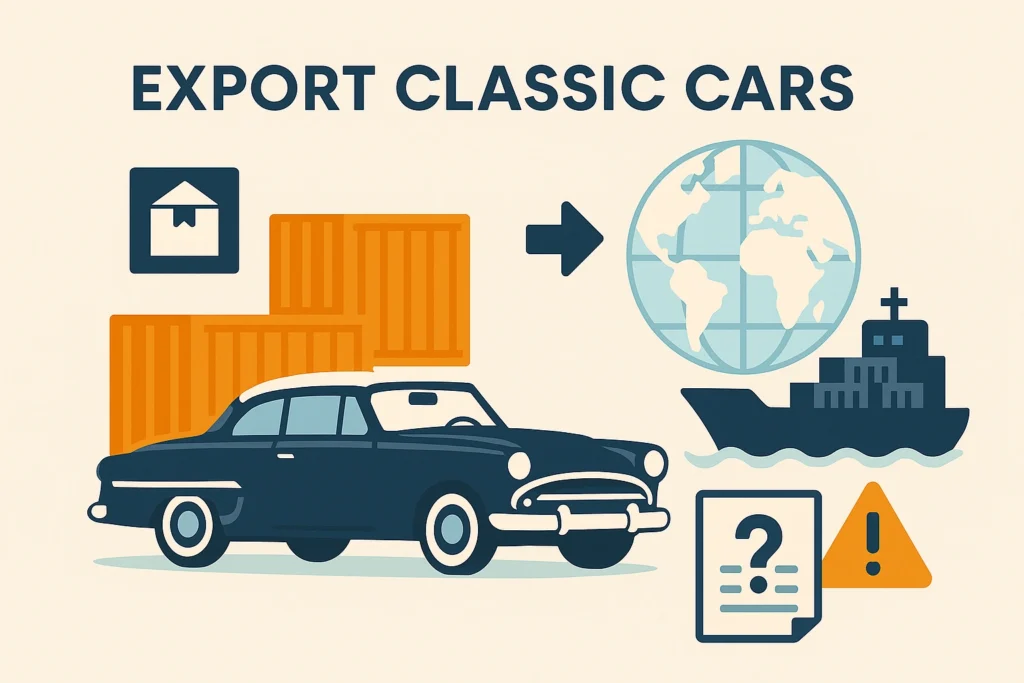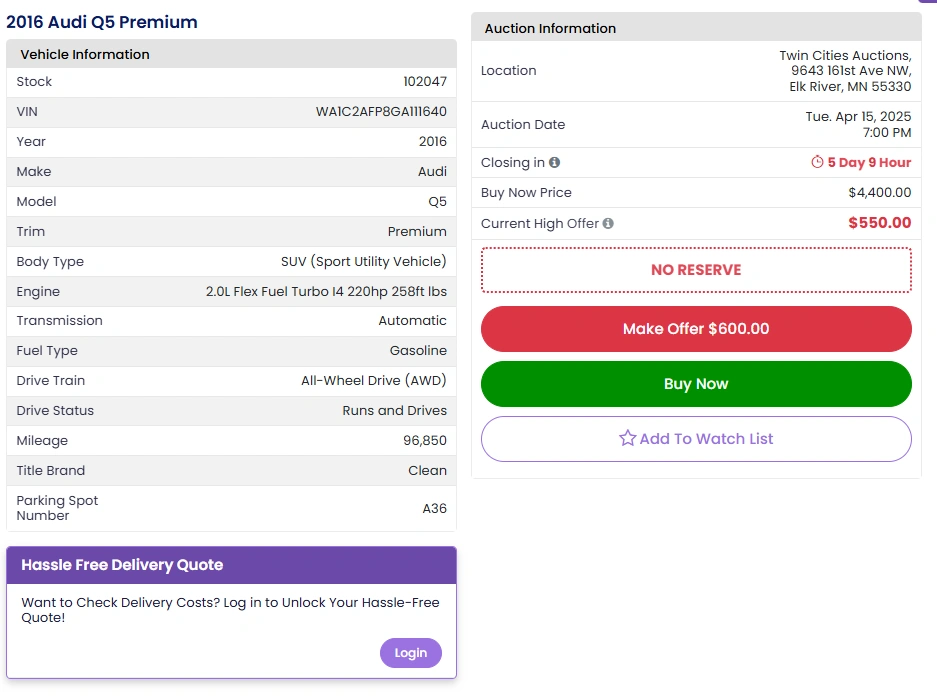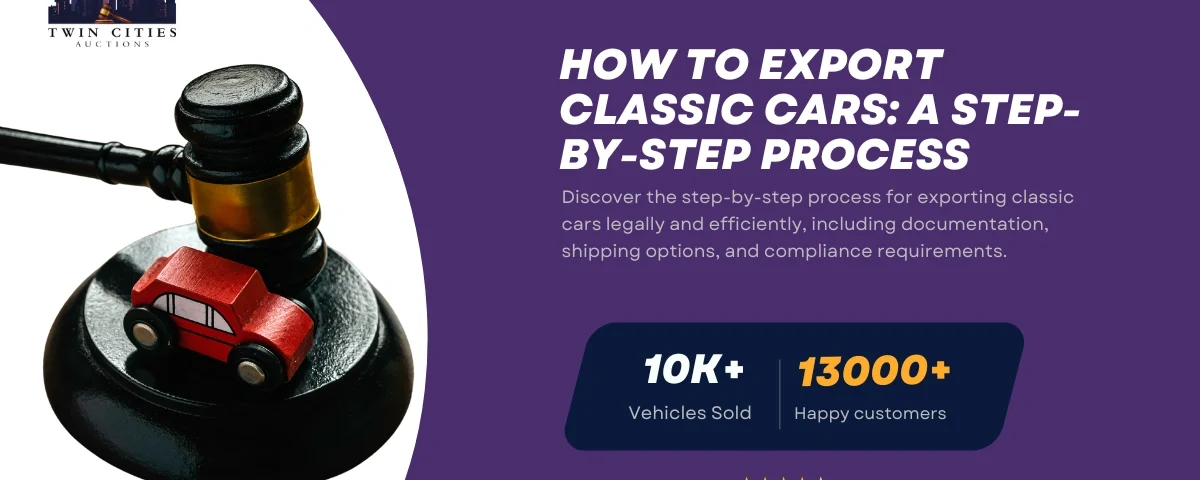Did you know U.S. ports handled more than 50,000 collectors and classic vehicles in 2024? Rising global demand, up 15 percent annually, makes vintage cars a thriving export market.
Yet regulations, paperwork, and logistics can overwhelm sellers and buyers alike. This comprehensive guide will help you source, prepare, and ship your classic cars smoothly, whether you’re in California or overseas.

Key Takeaways
- Understanding CBP, EPA, DOT, and FDA export requirements prevents costly holds
- Thorough vehicle preparation—titles, VIN verification, condition reports—streamlines customs clearance
- Auctions like Twin Cities Auctions offer broad inventories and on-site title checks for export-ready classics
- Selecting the right shipping method balances cost, speed, and protection for your vehicle
- Proper insurance, clear buyer agreements, and post-export follow-up sustain trust and reduce risk
Understanding Export Regulations
Exporting a vehicle from the United States involves compliance with multiple federal agencies:
- U.S. Customs and Border Protection (CBP): Vehicles valued over $2,500 require an Electronic Export Information (EEI) filing through the Automated Export System (AES).
- Environmental Protection Agency (EPA): Models built before 1968 qualify for an emissions exemption. Later vehicles may require an EPA “Letter of Exemption” or emissions modifications.
- Department of Transportation (DOT): A valid U.S. title and, in some cases, a DOT “No Objection” letter are necessary.
- Food and Drug Administration (FDA): Any vehicle with medical or refrigeration equipment triggers FDA screening.
Import requirements vary by destination. For example, the United Kingdom enforces an Individual Vehicle Approval (IVA) test, while Australia requires right-hand-drive conversions for some models. Research destination rules early to prevent customs holds.
Preparing the Vehicle
Proper preparation ensures a smoother export and import:
- Title and Ownership Documents: Verify a clear U.S. title, notarize signatures, and include any lien releases.
- VIN Verification: Record the VIN from multiple locations—dashplate, door jamb, and title—to confirm authenticity.
- Condition Report: Commission a specialist report detailing paint, bodywork, mechanical health, and originality.
- Photos and Video: Capture high-resolution images of all exterior panels, engine bay, chassis tags, interior, and any flaws. A narrated walkaround video provides further proof for customs and buyers.
Keep printed and digital copies of every document on hand for inspections.
Sourcing Vehicles for Export
Finding the right classic car begins with reliable sourcing channels:
- Specialty Dealers: Dealerships focused on vintage and collector cars often provide factory-backed inspections, limited warranties, and clear title histories—but their limited inventories and higher margins mean prices tend to be higher.
- Private Collections and Enthusiast Clubs: Owners often sell rare or highly original examples, sometimes before public listing. Relationships within club networks can yield exclusive opportunities, though due diligence on titles and condition remains essential.
- Auctions: Major auction houses offer hundreds of collector vehicles weekly. Twin Cities Auctions in Minnesota stands out with on-site title checks, transparent condition reports, and competitive bidding that can result in lower acquisition costs. Their preview days and technical staff help you verify provenance and title clarity before purchase.
| Source Type | Pros | Cons |
| Specialty Dealers | Inspections, warranties, clear titles | Higher prices, limited selection |
| Private Collections & Clubs | Rare finds, direct owner access | Variable pricing, title diligence needed |
| Auctions (Twin Cities, etc.) | Broad inventory, competitive pricing, title verification | Bidding uncertainty, fees apply |
Why Auctions Are a Smart Choice for Sourcing Export Vehicles
Major U.S. auctions present hundreds of collector cars weekly, many with documented histories. Transparent condition reports and on-site title checks reduce the likelihood of hidden liens or salvage brands. Preview days allow hands-on verification before bidding.
| Sourcing Option | Inventory Depth | Price Control | Title Transparency |
| Specialty Dealers | Dozens of classics | Fixed margins | Dealer warranty |
| Private Collections | Rare, hand-picked models | Negotiable prices | Owner-provided title |
| Major Auctions | Hundreds weekly across eras | Market-driven | On-site title checks |
Shipping Options and Logistics
Choose the method that balances cost, timing, and security:
- Roll-On/Roll-Off (RoRo): Direct drive-on shipping; most economical but offers minimal protection and is also commonly used for shipping to Africa.
- Container Shipping: Shared or dedicated containers shield vehicles from weather and theft; door-to-door options available.
- Air Freight: Fastest transit but highest cost, typically reserved for ultra-rare, high-value models.
| Method | Transit Time | Approximate Cost | Protection Level |
| RoRo | 3–5 weeks | $1,200–$1,800 | Moderate |
| Shared Container | 4–6 weeks | $2,500–$3,500 | High |
| Dedicated Container | 4–6 weeks | $4,000–$6,000 | Very High |
| Air Freight | 3–7 days | $10,000+ | Maximum |
Work with a reputable freight forwarder to book space, manage inland transport to the port, and handle export filings.
Customs Clearance and Duties
Accurate customs filings avoid holds and penalties:
- EEI Filing: Submit vehicle description, VIN, value, and destination in AES before loading.
- CBP Inspection: Present title, bill of sale, and condition report at the port.
- Import Duties: Vary by country; always consult local customs authorities for exact rates.
Providing complete, accurate paperwork prevents delays and extra charges.
Insurance and Risk Management
Protect your classic car during transit:
- Marine Cargo Insurance: Covers damage, theft, and general average; premiums around 0.5–1.5 percent of declared value.
- Carrier Liability: Usually limited to $500 per vehicle unless supplemented.
- Crating and Packaging: Reinforce bumpers, cover chrome, and pad vulnerable surfaces.
Document pre-shipment condition thoroughly to support any future claims.
International Buyer Considerations
Smooth transactions hinge on clear agreements:
- Payment Methods: Use escrow or letters of credit for safety.
- Fraud Prevention: Verify buyer identity and confirm fund clearance before shipment.
- Local Registration: Assist buyers with destination-specific inspections and plate registration.
Clear communication of responsibilities and timelines prevents misunderstandings.
Post-Export Follow-Up
After the car ships:
- Track Shipments: Use carrier and forwarder tracking tools.
- Handle Delays: Plan for customs backlogs, weather disruptions, or port strikes.
- Communicate with Buyer: Provide status updates and document proofs.
- Resolve Disputes: Keep all packaging and condition reports to address claims quickly.
Prompt follow-up sustains trust and fosters repeat business.
Why Auctions Are a Smart Choice for Car Purchases
Auctions can be an excellent source for late-model vehicles with clear chains of title and affordable pricing. Twin Cities Auctions, based in Minnesota, is one such reputable auction house that offers a wide range of vehicles at competitive prices.
Key Benefits of Buying from Auctions:
- Wide Selection: Auctions like Twin Cities Auctions offer a variety of vehicles, from low-budget cars to high-end models.

- Competitive Pricing: Auctions often offer vehicles at prices below retail value, enabling dealers to maximize their profit margins.

- Transparency: Auctions provide full vehicle history reports, so you know exactly what you’re buying.

- Convenient Bidding: Many auctions offer online bidding for your convenience, making it easier to source vehicles without being physically present.
Twin Cities Auctions: A Smart Vehicle Sourcing Choice
For those in the automotive industry, Twin Cities Auctions offers an excellent platform for sourcing quality vehicles at competitive prices.
Whether you are just starting or expanding your business, this auction house provides transparency, competitive pricing, and a broad selection.
| Feature | Description |
| Inventory Variety | Wide range of cars, trucks, and SUVs available |
| Competitive Pricing | Below-market pricing allows for higher profit margins |
| Vehicle History Reports | Detailed history reports for every vehicle |
| Online Bidding | Convenient online bidding options for dealers |
| Financing Options | Financing available to help with inventory purchases |
Conclusion
Exporting a classic car from the U.S. combines historical charm with complex regulations. By understanding export laws, preparing thorough documentation, and choosing proven sourcing channels—especially major U.S. auctions—you minimize risk and maximize value.
Engage experienced freight forwarders, secure meaningful insurance, and maintain clear communication to ensure your vintage vehicle arrives safely and legally at its new home.
Public Auctions Made Easy with Twin Cities Auctions
At Twin Cities Auctions, we strive to simplify the public auction process for everyone. You don’t need a dealer license to buy or sell cars here. Our online auctions are designed to be user-friendly and open to the public, ensuring that individuals of all experience levels—from novice buyers to experienced sellers—can participate with ease.
With a focus on transparency and ease of use, we provide all the tools and support you need to confidently participate in the auction process. Start your car buying or selling journey with us today and experience how straightforward and effective our auction system can be!
Looking for more options? Explore our comprehensive list of all available car auctions across the United States. Your next deal might be just a click away!
FAQ
What essential paperwork do I need for export?
A clear U.S. title, notarized bill of sale, EEI filing via AES, and any necessary EPA exemption letters.
How does the EPA emissions exemption work?
Vehicles built before January 1, 1968, automatically qualify; newer models need testing or modifications.
Which shipping method offers the best protection?
Dedicated container shipping provides the highest security and weather protection for vintage vehicles.
How do I calculate import duties?
Consult your destination’s customs authority; duty rates vary widely by country.
Can I drive the car to the port?
RoRo shipments allow you to drive on; containers require crane loading at the dock.
What coverage does marine cargo insurance provide?
It covers loss, theft, and general average; premiums depend on declared value and coverage scope.
How long does bonded-title processing take for export?
Two to four weeks once the PS2000B form and surety bond are submitted.
Where can I find major U.S. auction schedules?
Visit auction websites such as https://www.twincitiesautoauctions.com/ for upcoming collector car sales.
Source Links
https://www.cbp.gov/trade/basic-import-export
https://www.epa.gov/importing-vehicles-and-engines
https://www.autoshippers.com/insurance
https://www.twincitiesautoauctions.com/
https://www.carfax.com/
https://www.autocheck.com/
https://www.freightos.com/
https://www.kbb.com/


